(CNN) — Ann Patnaude is a soft-spoken White woman with a doctorate in art history. The 47-year-old lives in Seattle with her husband of two decades and their Black lab, Zoe.
Richard Lathan is a Black former gang member and an inmate at a prison in Southern California, where he is serving 15 years to life for murder.
On the surface, the two might seem like they have nothing in common.
And yet over the past three years they have forged a deep friendship that defies their cultural differences and the prison walls that separate them.
The pair have never met in person. But they write letters to each other, talk on the phone several times a week and have seen each other through a pandemic and bouts of sickness — Lathan’s coronavirus and Patnaude’s fight with multiple myeloma.
Ann’s husband, John Patnaude, marvels at their close friendship.
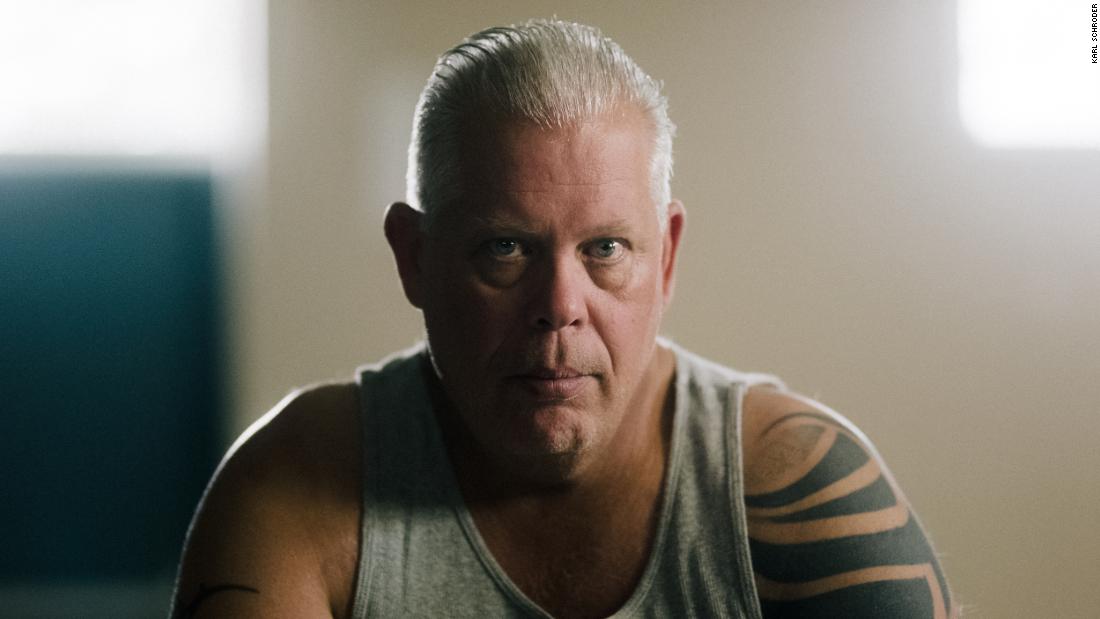
A Marine who hated Muslims went to a mosque to plant a bomb. His intended victims ended up saving his life
By John Blake, CNN
Richard “Mac” McKinney appeared at a mosque one Friday afternoon because he wanted to kill Muslims. But mosque members diffused the Marines’ fury with a form of resistance he was not prepared to encounter.
“I was a little cautious at first.” he says. “But through his letters to Ann, I have gotten to know Richard, which really changed my view of the whole situation. His letters reflect someone who’s completely different from the person he was when he first went to prison.”
Richard has been behind bars for 31 years — most of his adult life, and most of it at California’s notorious San Quentin State Prison. He admits he committed a lot of crimes as a gang member, but maintains he has never killed anyone and was wrongly convicted of murder.
He got a glimmer of hope last year when he learned a former police detective involved in his case is under review over possible misconduct for allegedly using the n-word to describe suspects — a bombshell that could potentially win him a new trial. Richard was recently transferred to the California Institution for Men in Chino as he awaits a parole hearing in November.
Their paths would likely have never crossed if Ann hadn’t heard Richard interviewed five years ago this month on a podcast. At the time she volunteered at a hospital, providing companionship to terminally ill patients.
This is the story, in their own words, of two people from different worlds brought together by compassion, curiosity and a desire to connect. Richard’s account came from numerous phone calls with CNN from prison. Their words have been edited for length and clarity.
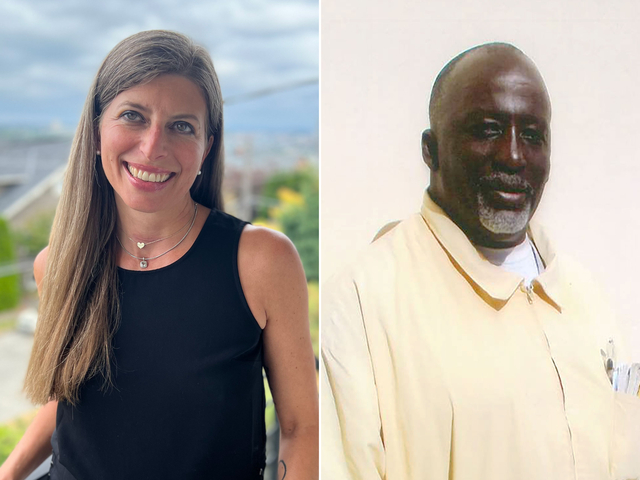
ANN PATNAUDE: In October 2017, I was listening to a podcast about prison life. Richard came on to talk about his work as a volunteer with the gold coats, a sort of prison nurse’s aide. He shared how his work involves helping sick people who need to go to the infirmary. Or if someone’s had an accident or needs help changing a colostomy bag or anything like that, he is right there to help. He spoke with such passion, empathy and compassion about what he did. For whatever reason, that story stayed with me for a while. I wrote him a letter and and sat on it for months because I didn’t know how to reach out. I’m a stranger and it felt a little bit like fan mail. I finally mailed it in August 2019.
Dear Mr. Lathan,
I heard your story … and wanted to contact you. I was moved deeply by your work as a gold coat. It takes a compassionate personality to care for those who are ill, and I related to your story because I volunteer at a local hospital in Seattle …
RICHARD LATHAN: I was surprised when I got the letter. I’m 53 — I’ve been in prison since I was 21. Never in my wildest dreams did I think anyone would be interested in my life or my work. I wrote back, but I did not expect to get a response.
Dear Ms. Patnaude,
I have read your letter several times over and yes, I cried because it feels so good to get acknowledged for the good things that I do. Your letter is so beautiful. I have shown it to quite a few people ….
ANN: At the hospital, sometimes I’d sit with patients who were dying and wanted companionship but didn’t necessarily have someone to be with them. With both of us volunteering in those capacities, I felt like we could connect over that. In the podcast, Richard said he felt like he’d taken so much in life and this was his way of giving back. And I said, you know, I hope that you can find true compassion and forgiveness for yourself. And that struck up a conversation. One of the things I love about him is he’s very emotional, he’s OK to cry … I call him a big softie. He was just willing to express himself and be open. And we just started talking through letters.
Dear Mr. Lathan,
May I call you Richard? I was surprised and delighted by your letter. You may hear this often, but your handwriting is so lovely. When I first saw the envelope in the mail, I thought I was being invited to a fancy party. 🙂 But, even better, it was a letter from you … Little did I know, I was being invited into a wonderful friendship.
RICHARD: Every time I wrote back, I did not expect to get a response. At the time, my work as a gold coat involved stuff such as cleaning up blood, crime scenes, helping elderly people care for their scabs, removing lice, everything. Our jobs were different but similar. But I kept asking myself, I’m I worthy of having a friend like her? Never. Because I’m a man in prison that she didn’t know. I’m a criminal. I was surprised that she kept writing. At first, I didn’t know how to respond … but I tried to respond within the boundaries of respect. The same compassion she showed me, I tried to show it to her.
Dear Ms. Patnaude,
Yes, you may call me Richard. I am so happy that my letter has caught you in a good mood. You are very much invited to a fancy party as long as you are smiling and having a good time … Sorry it took so long for me to respond. Please continue to write.
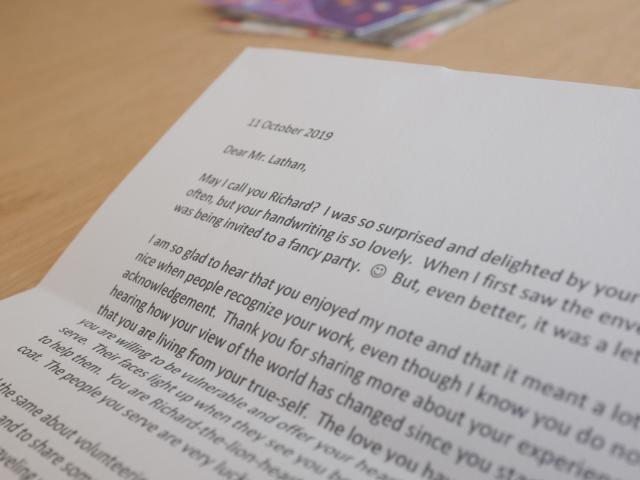
ANN: Richard is a beautiful writer. He has a really high emotional intelligence and he’s not afraid to express his gratitude. Or when he talks about the work he does as a gold coat, he will say extraordinary things like being of service to people is what makes his life worth living. When we started getting to know each other, I would ask him questions like, what’s your favorite movie? Or, what kind of music do you listen to? And what do you do with your time when you’re not helping people?
Then we decided to start talking on the phone. I set up a prepaid phone for that — you put money on your phone through this system and then you give him your number and when he calls, I pay for the calls that I receive from him. These are all things I’ve had to learn. It’s so frustrating because if you miss a call, you can’t just text or say, I’ll call you right back. I have a special ring for his calls — a ringtone called Sencha. Sometimes, you go through long periods where you haven’t heard anything. It can be stressful because you feel concerned for your friend.
Dear Mr. Lathan,
May I ask you a question? You do not have to answer. I’m curious, knowing what you know now, what advice would you give your younger self? Forgive me if that is too personal. Please do not feel obligated to respond.
RICHARD: The best way I can describe getting her letters and talking to her on the phone is like being a fat kid in a candy store. We’ve talked about everything … what music I listen to on my CD player — Luther Vandross, Andrea Bocelli — something soothing, somber, nothing with racial undertones. We talked about movies, like “The Preacher’s Wife” with my favorite actor, Denzel Washington.
My journalism and screenwriting classes, public speaking, my poetry. We even talk about health issues — my seizures and anxiety, which I take medication for. She also told me that she was dealing with multiple myeloma. I looked it up in the library and saw it’s some kind of cancer. I’m getting emotional now just talking about it. I wish I can bring her peace. I wish I can help her in some kind of way. One time she was sick and I couldn’t reach her. I cried that day, I couldn’t go to sleep.
Dear Ms. Patnaude,
You can ask me any question that you want and I will answer them, all of them. … Knowing what I know now, the advice that I would give to my younger self is to always ask questions about manhood, womanhood, life … because your belief system will constantly change. Also go to someone that you believe truly has your best interest at heart.
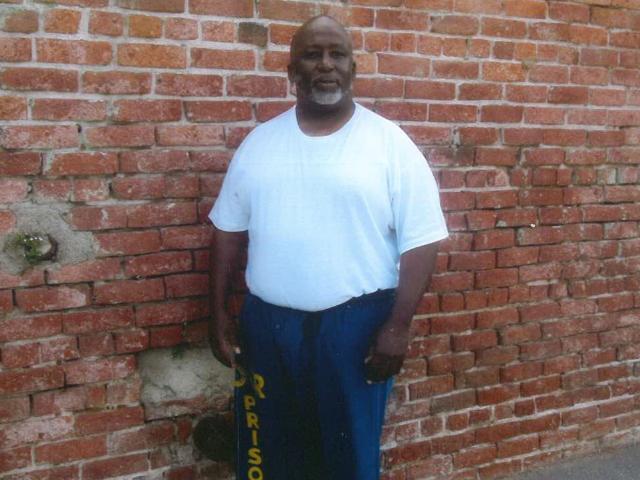
ANN: We’ve had conversations about dating, and how he should treat women. Race in the US. We’ve talked about White space, White power, White supremacy, White privilege, White silence, what it means to be a Black man in America. Who has access to things and who doesn’t. We have discussed anti-Asian racism and violence. What stands out for me in all of these conversations is Richard’s empathy. He has an ability to see how all sides are interconnected and that we truly need one another. Richard has a deep desire for truth and reconciliation, wanting to know when we can get to a point in society where we can stop harming each other. Richard also has a desire to be the change he wants to see in the world, and believes that change begins with the self.
RICHARD: I ask her questions about women, because I was never taught how to be a man. I used to think being with a woman was the graduation of manhood — it took prison for me to know that’s not true. She’s taught me as our friendship moved forward that it has nothing to do with that. I didn’t know her race when we started exchanging letters. I did not know that she was White until months later, when she sent me a photo of her family. By then it was too late — we were already friends. But that’s never been an issue. The color lines may be drawn outside, but that stuff is not in the way. I can’t fathom not being her friend over that.
Dear Ann,
We may have our differences because of what we have inherited from our ancestors … but we as humans don’t have to adhere to the illness that splits our souls dramatically without knowing why. Color cannot be the only reason for our division.
ANN: One of the things I’ve always appreciated about our friendship is his realness. I like that he’s willing to be open and vulnerable and honest. When we’re on the outside in society and culture … we’re not always like that with each other.
RICHARD: I had no idea that a stranger would become like a mother figure to me. She has an unbelievable courage about her. At times, she had me crying that a person like me would have this type of friendship. I grew up on the streets. My mother kicked me out when I was 17. I told myself, if my mother doesn’t care about me and I don’t see my father, why should I care about anyone else? I grew up fighting the world … my heart was frozen. I didn’t understand anything beyond survival, shootouts, drugs, smoking weed, robbing and things of that nature. And the more we talked, I could feel the onion peel, my heart opening, the ice starting to melt.
In my mind, I thought I’d have to battle the world by myself. And she gave me this gift. It’s very astonishing, this friendship. I don’t know what I did to deserve it.
I pray for her every single day. She chose to be my friend, with no clauses. That’s unconditional love. She does not look at me as a prisoner. Or someone who was in the gang. She looks at me like a human being. My mother died while I was in prison. I feel like Ann’s son from a different life. I’ve never had friends like her. That’s what I have been looking for my whole life, that’s what I needed. And I don’t have to battle for it like in my past life.
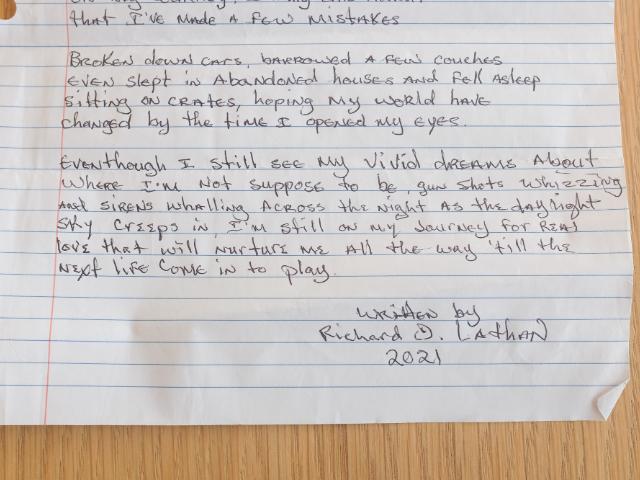
ANN: John is equally as invested in this friendship. Sometimes, my ringtone will go off, and my husband and I will both rush to the phone so we don’t miss the call. If Richard doesn’t communicate for a while, sometimes John will say, have you heard from him recently? During football season Richard will ask, who is John rooting for right now? And when Richard writes, he always says give John and Zoe big hugs.
RICHARD: John and Ann — I don’t see my life without them. They’ve become my family. They took me as I am. No ifs, buts, you gotta change this. They see me for who I am. Sometimes I ask Ann to tell me if I’m I butting in. I don’t want to disrespect her or John because she is married. And she will tell me if I was butting in, she would not answer the phone.
I’ve never had this kind of friendship. I didn’t trust nobody, I didn’t know how to. I lived on the streets of LA, slept on a crate. I sold drugs. Heroin, crack, weed. It’s taken a while to get here. Self-help classes, some of which have turned out to be therapy classes. By the time you leave the class you’re either crying or walking with your head up. You’re in there with total strangers. The only thing you have in common is you committed the same crime or you’re in prison. Through all the work, I’m learning to forgive myself and open up to others. I’m learning to ask for forgiveness.
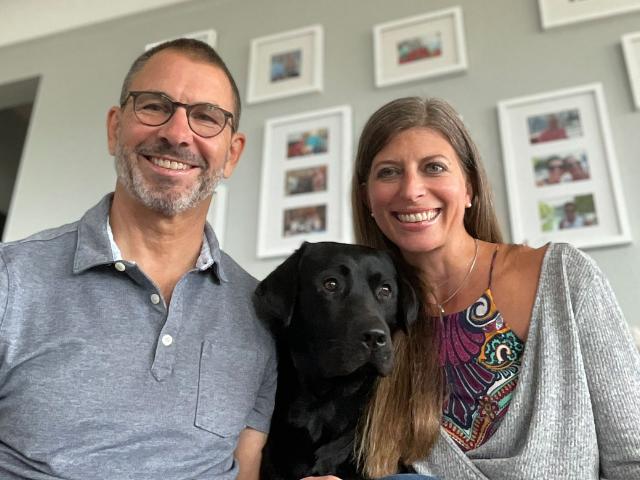
ANN: Richard has taught me what it means to have grace and equanimity no matter the circumstances. He has taught me what it looks like to face each day, each hardship, each setback, with good humor, dignity and honesty. He has shown me that there is strength in vulnerability. He tells me when he was a young man, he was a very angry person. And how he’s overcome that in himself and doesn’t let that take up space in his brain. And he has this way of moving through the world and seeing the world that I certainly admire. He gives me such a perspective of inside, outside, male, female, Black, White.
RICHARD: Our friendship has taught me how to ground myself. How to be balanced. How to have courage. How to speak with manners, instead of being an … excuse my French … a-hole. She has a motherly way that’s strong but easy, and it gives me a lot of confidence. She’ll let me know that something ain’t right and I should try to approach it in a different way. I never learned simple things like manners, or women and dating, before I came to prison. I can ask her anything, and she will answer it in the best way she can.
I never killed anyone. But sometimes I feel like they threw me in prison to pay for all the other things that I did. Ann once asked me if I’ve forgiven myself. That question blew me away. I made a promise to myself that I would never leave prison the way I came — angry, outlandish, defiant. Once you establish forgiveness, everything else comes from the heart.






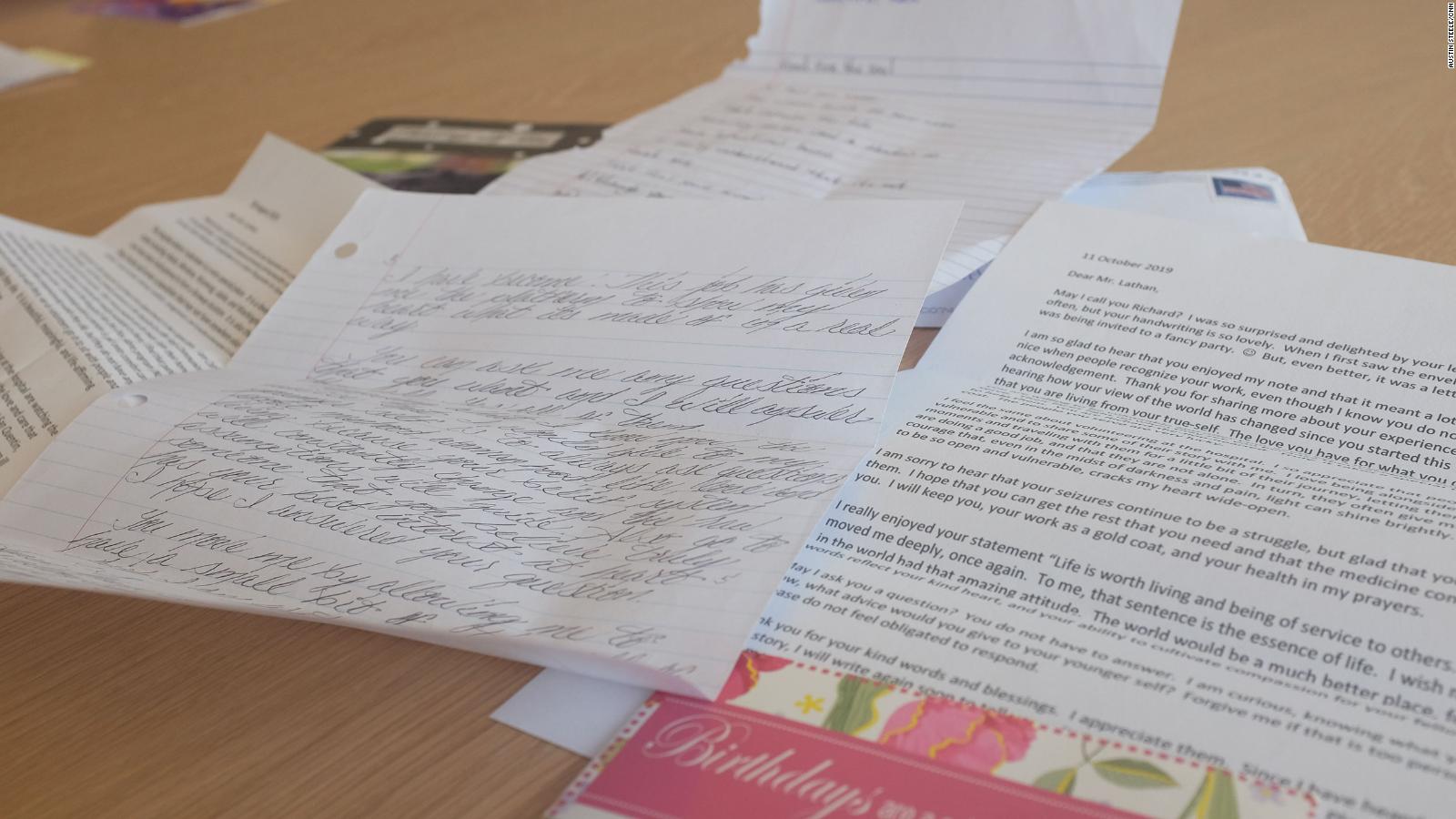
More News
McKinsey Is Under Criminal Investigation for Its Opioid Work
Flooding Inundates Kenya, Killing at Least 32 and Displacing Thousands
Campus Protests Over Gaza Intensify Amid Pushback by Universities and Police